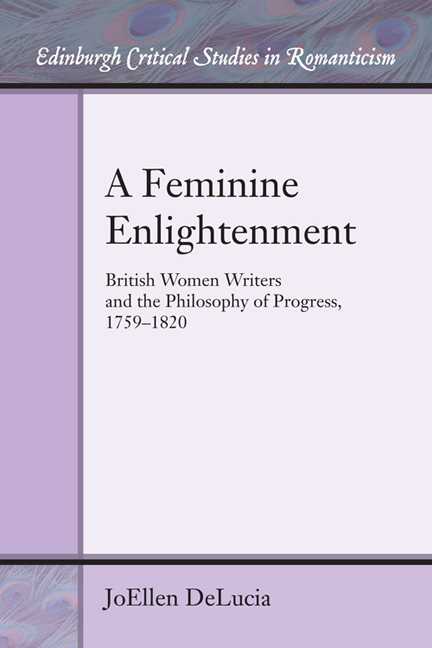Book contents
- Frontmatter
- Contents
- Acknowledgments
- Introduction: A Feminine Enlightenment?
- 1 The Progress of Feeling: The Ossian Poems and Adam Smith's Theory of Moral Sentiments
- 2 Ossianic History and Bluestocking Feminism
- 3 Queering Progress: Anna Seward and Llangollen Vale
- 4 Poetry, Paratext, and History in Radcliffe's Gothic
- 5 Stadial Fiction or the Progress of Taste
- Epilogue: Women Writers in the Age of Ossian
- Bibliography
- Index
5 - Stadial Fiction or the Progress of Taste
Published online by Cambridge University Press: 05 August 2016
- Frontmatter
- Contents
- Acknowledgments
- Introduction: A Feminine Enlightenment?
- 1 The Progress of Feeling: The Ossian Poems and Adam Smith's Theory of Moral Sentiments
- 2 Ossianic History and Bluestocking Feminism
- 3 Queering Progress: Anna Seward and Llangollen Vale
- 4 Poetry, Paratext, and History in Radcliffe's Gothic
- 5 Stadial Fiction or the Progress of Taste
- Epilogue: Women Writers in the Age of Ossian
- Bibliography
- Index
Summary
Reviewers of Romantic-era novels often cited lack of verisimilitude, particularly in novels written by women, as a major failing. In a review of the Irish novelist Regina Maria Roche's The Maid of the Hamlet (1794), a writer for the British Catalogue complained that, “The conduct of this Novel is not upon the whole happily managed; the rules of connection and verisimilitude are not sufficiently adhered to: the narrative is too frequently broken, and probability too grossly violated.” In addition to “broken” plots that play fast and loose with “the rules of connection,” Romantic heroines often possess unimpeachably exquisite tastes and manners; paradoxically, they are reared in rural isolation, far from the bustling modern world in which taste and manners are cultivated. For instance, the heroine of Maid of the Hamlet, the beautiful orphan Matilda, although “educated in retirement,” was “brought up in elegance,” “easily instructed in every accomplishment,” and “to these accomplishments [she] united a graceful demeanour and insinuative address.” Characters like Matilda act as precursors to more celebrated and familiar Romantic heroines, such as Glorvina from Sydney Owenson's The Wild Irish Girl (1806), who possess polished manners and sentiments that appear at odds with the rural landscapes and the ruined or impoverished habitations they occupy. Out of place and often anachronistic, Romantic heroines violate “probability”; although reviewers saw many of these novels and heroines as aesthetically flawed, this chapter argues that these improbable plots and heroines can also be read as figures for the progress of taste, a progress which unfolds as these heroines travel through a variety of social and economic environments.
The central figure of Regina Maria Roche's widely popular The Children of the Abbey (1796), Amanda Malvina Fitzalan– whose middle name recalls the most famous female bard of the Ossian poems– typifies the incongruities that mark such heroines. When Lord Mortimer– Amanda Malvina's soon-to-be suitor– discovers her in rural Wales, he is amazed that an inhabitant of one of the rustic “cottage[s]” near his estate could command such refined sensibilities. He sends Howel, the local curate, to explore “the real situation of Amanda,” and her developed tastes instantly enchant the minister:
The objects about them naturally led to rural subjects, and from them to what might almost be termed a dissertation on poetry… she was a zealous worshipper of the muses, though diffidence made her conceal her invocations to them.
- Type
- Chapter
- Information
- A Feminine EnlightenmentBritish Women Writers and the Philosophy of Progress, 1759-1820, pp. 153 - 186Publisher: Edinburgh University PressPrint publication year: 2015



